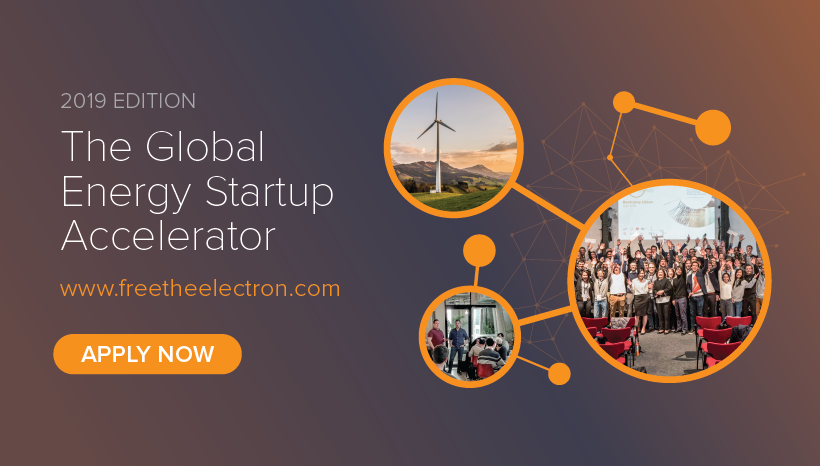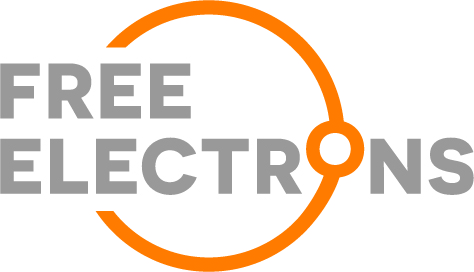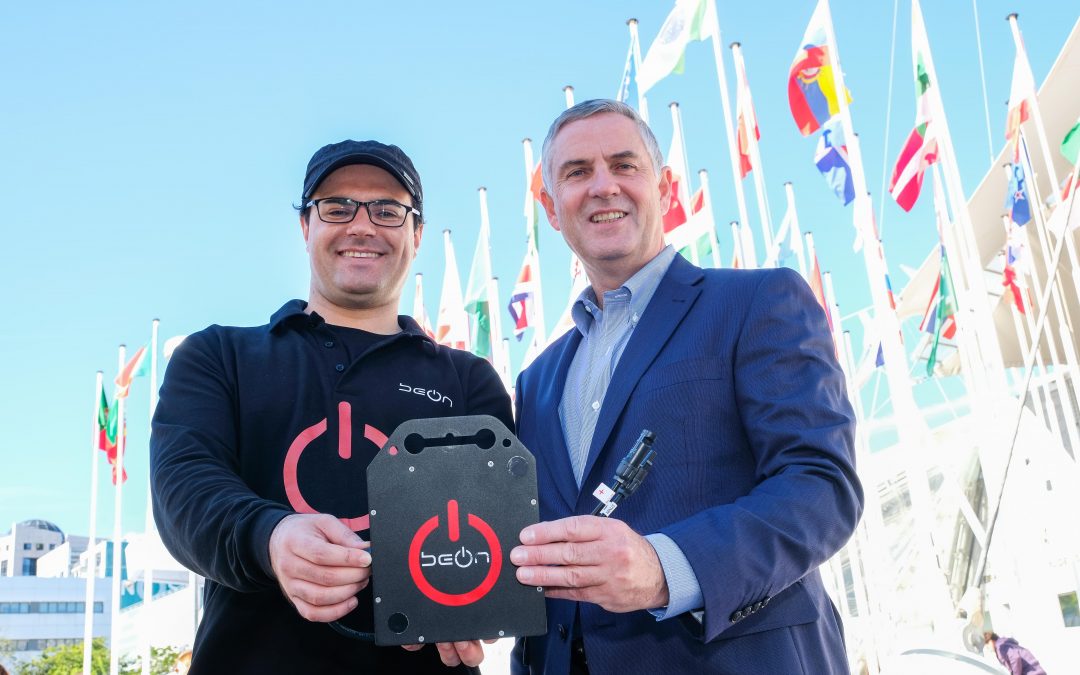
by silvia | Jan 22, 2019 | Startups
Applications are open for Free Electrons – the first truly global acceleration program, that connects the most promising startups with leading utilities in the energy sector. The program seeks to find solutions in the mobility, clean energy, smart grids, and digitalization.
On March 13th, the startups selected for the bootcamp (happening in Dublin) will be announced.
Just like the last edition, the program will have 3 modules: the first in Columbus, in the North-American state of Ohio, in May; the second in Hong Kong, China, in June; and the last module will happen in Lisbon, in September, when a winner will be announced – winning a $200.000 prize.
In its 3rd edition, Free Electrons already has a successful history: several pilots began business partnerships between the startups and the utilities and last edition’s winner, SOLshare, is revolutionizing the energy market in Bangladesh, where over 50 million people still can’t access the electrical grid.
Partnering up
The founders of Free Electrons are Ausnet Services (Austrália), DEWA (Dubai), EDP (Portugal), ESB (Irlanda), Innogy (Alemanha), Origin Energy (Austrália), SP Group (Singapura) e Tokyo Electric Power (Japão). In 2018, the American Electric Power (USA) and CLP (Hong Kong) also joined the program, with the program being powered by Beta-i.
These 10 utilities of the energy sector have, together, around 80 million clients and are located in more than 40 countries – which gives mature energy startups the chance to go global by accessing these partners.
Applications are now open until the 22nd of February.

by Carolina Santos | Mar 8, 2018 | Startups
In the wake of Free Electrons closing its applications it’s time to speak numbers. The first global energy startup accelerator program that connects the world’s most promising smart energy startups with leading utility companies was a success. And the reason why it was a success is because everybody worked as a team, there were no time differences there was only hard-work.
515 startups from 65 countries applied to the program. From these 84 are from the United States of America, the most represented country, 30 from Brazil and 29 from India, closing the top 3. Australia had 24 applications, Spain, United Kingdom and Germany all had 23 and Portugal 14.
Luís Manuel, Executive Board Member of EDP, said “We couldn’t be happier with the applications process. The bar was set very high with 451 applications so we are very pleased to have exceeded that number. Also, 72.1% declared that they are not currently in a fundraising process, a fact that speaks to the overall maturity of the candidates. We believe that this is critical, as we are looking for innovative solutions, that can be adopted and integrated in our companies, and not only fresh ideias”.
When the program was launched the focus was clean energy, smart grids, energy efficiency, management and access, e-mobility, customer solutions and business models and the success of a program is also measured by the startups that apply and if they are a good match and looking at the numbers there are reasons to celebrate – 22% from Clean Energy, 15% IoT and Digitalization, 12% Energy Efficiency and 7% Smart Grid.
Manuel Tânger, Co-Founder & Chief Open Innovation Officer at Beta-i, believes “Free Electrons is all about harnessing potential and generating innovation, while learning in that process! This is a great opportunity for utilities from 8 different geographies to come together and create something unique, tapping into the power that startups are already generating in several different industries. For us, it’s a unique chance to demonstrate, yet again, our vision of how innovation will stem from partnerships between startups & corporates, and how it will become the new normal”.
Last year’s edition, generated an overall financial value of contracts signed between the 12 startups and the 8 utilities of about 2 million dollars, with a pipeline of ongoing opportunities surpassing 12 million dollars. The future is unknown but we’re all about exceeding numbers.

by Carolina Santos | Feb 12, 2018 | Startups
A lot as been said about Free Electrons, that’s an unique opportunity for energy startups, that eight giant utilities can change the life of those who apply to the program and that the winner is winning USD200,000. All of it true but there’s more to it.
There’s a “behind the scenes” that normally people don’t talk about on a program like Free Electrons, where winning is not the main goal but the opportunity to do business with the utilities. The business potential of Free Electrons is huge and startups know that, and if they don’t they should.
Let’s talk numbers: the program allows the fastest business-to-business relationship ever, it’s kind of a fast lane for business-to-business. For any startup to have this kind of relationship in such a short period of time it would involve spending a lot of money and due to this program they don’t need to spend a cent.
At the end of the Free Electrons 2017 third module, in Singapore, late September, the global financial value of the contracts signed between the 12 startups and the 8 utilities was about 2 million dollars, with a pipeline of opportunities being developed reaching over 12 million dollars. Who’s still thinking about the prize money?
Beon rapidly grew after winning the first edition, it has pilots with six utilities, but it wasn’t the only startup that benefited from the program. In the beginning of this month a portuguese digital newspaper wrote about Aperio Systems, a cybersecurity israeli startup, that was also on the program and won most innovative energy startup, that was invested 3,6 million euros by EDP Ventures (alongside Data Point Capital and Scopus Ventures).
There are some changes in this second edition in order to improve the experience for both startups and utilities. There will be a bootcamp but not a traditional one. Instead of selecting the 12 finalists, 30 will be chosen, they will be evaluated according to the most viable pilot and from that 12 will emerge.
Gonçalo Negrão, Program Director, believes that “the startups need to make the most of the time they have with the utilities” and when asked about what he truly wants for this edition he says “we want to establish efficient and long-term business relations between the startups and the utilities”. More than that he aims that this edition “is more than a program, is the beginning of the biggest energy community that ever existed and a step towards collaborative innovation”.

by Carolina Santos | Jan 31, 2018 | Startups
When Rui Beon, as he is now known, won Free Electrons last year he made an emotional speech that he claims “rarely happens”. He wasn’t expecting, this wasn’t an Oscar night where the winners already know they’re going to win because they’ve won everything during the award season. This was the first edition of Free Electrons. None of the startups really knew what they’re getting themselves into. They only knew that eight giant utilities didn’t come knocking on their doors every day.
But let’s start from the beginning. Rui, was just a kid when he first started inventing gadgets, and having this passion for everything electronic and that’s why he decided to study electrical engineering. Little did he know how sealed was his fate.
BeOn Energy was founded in 2014, during an innovation program from EDP and they have been working together ever since. BeOn is a company developing solar technologies and it’s the first company in the world developing and producing PV panel integrated controllable microinverters, specially designed for energy self-consumption and smart energy management solutions.
The idea is nothing new, it’s been out there for over 20 years, but only in the past 10 years there’s the technology to make it possible. Rui admits that what caught the utilities attention was the simplicity, how quickly it can be installed and the democratization of the solar energy. Also, in two years the European Union is demanding that every building has renewable energy. So BeOn, as well as its clients, will be in pole position.
Throughout the program, Rui says he never thought about the prize money, he believes that the true opportunity of Free Electrons is being able to work with some of the utilities more than winning the final prize. “Those startups are not competing for the best idea, they are there to do business”, says Rui.
However, the startups got a little too overwhelmed with the dimension of the program and kind of forgot they had to work towards a goal. He believes all of them could have done better but they “woke up too late”. When asked what advice he would give to startups applying to Free Electrons this year he says that they need “an urgency to do more, to grab the opportunity and don’t let go, give their best and mainly never lose focus”.
Today BeOn still has a pilot with SP Group and another one with ESB, having other projects on the pipeline and is also working with other startups from Free Electrons, because, you may be surprised, they’re actually friends. It is not a matter of winning or losing, it’s a matter of joining forces and contribute to a better world (and do business).
It’s a win-win
You’re probably wondering what do the utilities gain with all this? Like every company in this world it has come the time for utilities to reinvent themselves, and there’s no such thing as rivalry among all eight utilities, they actually help each other out. Not only they know they’re stronger together but also they know that if they don’t understand the future business model they’ll end up struggling in the future, so it’s a win-win.
Future Free Electrons startups know one thing for sure: nothing comes easy, nothing comes that you are not supposed to have. Rui made it this far because he fought a lot. If you ever get the chance to see the video of his victory you’ll hear about his past. He was born poor, he didn’t have any utility at home, meaning he didn’t have electricity or water and he now works for eight of the biggest utilities in the world.
Rui doesn’t believe in coincidences not even when he found out that his great grandfather worked at a coal mine where now is the famous MAAT fed by BeOn energy and where the Portuguese module of Free Electrons took place. He doesn’t think it was destiny, he likes to think he built his own destiny.
Having spoken with people who worked with him during the program I know that he built his own destiny because he never gave up, he never lost focus. But you know, some things are just meant to be, it seems like all stars align for some people to get exactly what they’re supposed to. This was his future all along, it was always in his blood and it can also be in yours. You’ll only realize once it happens. Like he did. Whether you face it as destiny or hard-work or both, that’s up to you.

by Carolina Santos | Jan 16, 2018 | Startups
Things you have to keep in mind before I explain Free Electrons: it was launched by eight giant utilities (EDP, TEPCO, Dubai Electricity & Water Authority, innogy, origin, AusNet services, SPgroup and ESB), the program is for energy startups and the award is US 200,000 no strings attached.
Do I have your attention now? So, let’s explain it. Free Electrons is on its second edition and its main goal is to reach startups developing solutions in mobility, clean and smart energy and digitalization. In a week the startups will go through three acceleration modules between April and October 2018, those will take place in San Francisco and two other locations, one in Europe and the other in the Far East.
As you may have figured out by now, it’s an unique opportunity for startups in the energy sector to grow and develop their business. Still interested? Then apply until February 23, 2018. See you on the other side.




